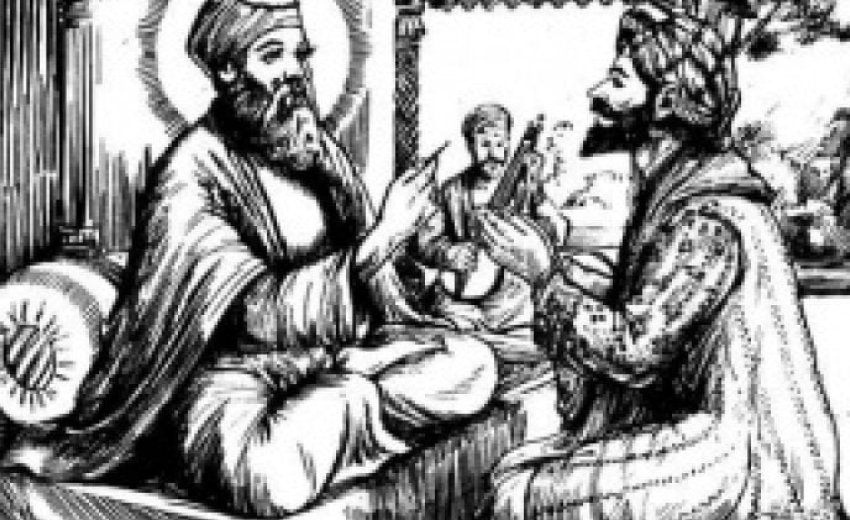The stories about our ancestors help kids become good. When they listen to these stories, they learn to do what the True Guru wants. This means they understand and follow what's right.
Bhali Karre kartaar !!!!!
( Guru Granth Sahib Ji - 951)
Guru Nanak was the very first leader of the Sikhs and he started the Sikh religion. He traveled to many places, and once he went to Lahore, a big town in Pakistan. In Lahore, there was a very wealthy man named Duni Chand. He was incredibly rich, owning seven million rupees. To show off his wealth, he had seven flags on his house.
When Guru Nanak arrived, Duni Chand was hosting a big feast called sharadh for his late father. In this feast, Hindus give a lot to the Brahmans, thinking it will help their ancestors in the afterlife. They offer delicious food, nice clothes, and money to the Brahmans. It's known as Dakshana. Duni Chand had invited many Brahmans and holy people for this feast, including Guru Nanak.
Guru Nanak sat down nearby and told Duni Chand he would wait until the Brahmans finished eating. Duni Chand agreed and organized a lavish feast for the Brahmans, giving them money and clothes as a form of offering. He thought this would benefit his deceased father. Once the Brahmans left, Duni Chand invited the Guru to eat, but instead of accepting, the Guru just smiled.
"Duni Chand," he said, "Do you think that your father is no longer hungry? Have your gifts reached him?"
"Yes, sir," said Duni Chand. "The Brahmans have eaten so much that my father needs no more food for at least a year. He also has enough money and clothes to last for one year."
The Guru chuckled and told Duni Chand that the Brahmans would eat the food, sell the clothes, and spend the money, making it hard for him to see how it could reach his deceased father. Duni Chand agreed, saying he couldn't understand it either, but it was believed to be God's Will as told by the Brahman. He admitted he was initially wary, thinking the Guru, being a Brahman, would understand, but was relieved not to have wasted food on him.
Acknowledging Duni Chand's decision, the Guru explained that he couldn't take the food to Duni Chand's father, hence not wanting it to go to waste. He encouraged Duni Chand to treat the Brahmans however he wished and stated he didn't require any food himself. Instead, he asked for another favor from Duni Chand.
"Yes, gladly," replied Duni Chand.
The Guru gave Duni Chand a sewing needle, asking him to keep it and return it in the next life. Duni Chand was puzzled, wondering how he could take it with him when he died.
The Guru pointed out that if an old Brahman could carry plenty of clothes, food, and money for a whole year for himself and others, why should a small needle seem too heavy? He questioned how Duni Chand could take all his wealth, horses, gold, and precious items to the next world if the Brahmins couldn't do that work.
This made Duni Chand realize the point. Seeking advice, he was told by the Guru to work hard, share with the needy, and keep faith in God, not worrying about his ancestors.
Duni Chand told the Guru that he already had many servants and gave money and clothes to holy men who sang hymns at his house. The Guru advised Duni Chand differently, saying he should give his wealth to the poor, work hard alongside his servants on the farm, and share the earnings equally among them. He suggested Duni Chand treat his workers like family, sharing and giving to charity from what he earned through honest labor. The Guru emphasized that only what one earns honestly and gives to the needy in this world can be expected in the next.
Duni Chand took the Guru's advice to heart. He left behind his royal life and began to work with his own hands, and his wife joined him in this new path. Their home transformed into a sanctuary where everyone, regardless of wealth, race, or status, gathered to sing songs of God. They followed the Guru's teachings, guiding many others to do the same.
The Guru had advised Duni Chand to give his wealth to those in need, as it hadn't been earned through honest work. Instead, he was encouraged to toil on his farm alongside his workers, sharing all earnings equally among them. The Guru urged him to generously give to charity from his own share, treating his workers as family and spreading love to all. Duni Chand was taught that in the afterlife, one receives only what they've honestly earned and given to others in need during their time on earth.
"Work hard and share your earnings with the needy Nanak; thus shall you find the way to God's Grace."
(Satguru Sri Guru Nanak Dev Ji, the King of kings and the Saint of saints)
*Based on an article by Kanwaljit Singh, published in Tuhitu blogpost on 19th January 2011
